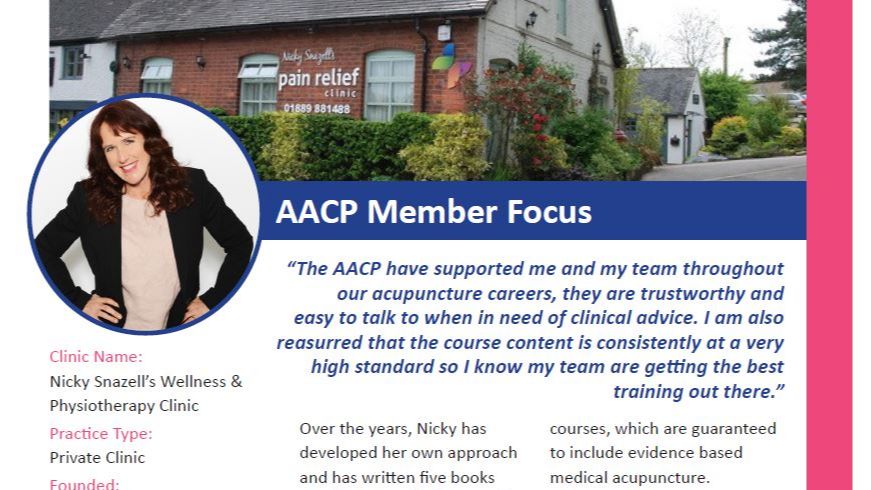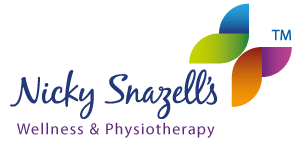Major National Shift of Opinion On Treating Chronic Pain
Some of you may remember the time when there was a national outcry about the so-called ‘post code lottery’ with the treatment on offer from the NHS varying dependent on where you lived.
Subsequently a new organisation, NICE (National Institute for Health and Care Excellence) was setup to take responsibility for authorising which treatments should be made available in the NHS. Those treatments approved were then to be made available by the NHS equally to everybody and thus put an end to the so-called post code lottery.
NICE thus has essentially total control of what the NHS can and cannot offer. Their published guidelines are broadcast by the press, radio and TV and as such the general public are influenced by the NICE recommendations. This in turn has an indirect impact on private healthcare providers, as the public perception on what is good, bad and ugly will align with what they see and read in the media.
Acupuncture In The NHS
Over recent years acupuncture acceptance in the NHS has generally been in decline, with some regions considering it quackery, using the NICE guidelines as support, while others still considered it a valuable treatment. Some of our own therapists who worked part time with us, and full time at the NHS, reported being banned from using acupuncture in the NHS and they came to us to retain their skills in what they considered a beneficial treatment.
Back Pain and Acupuncture
For a number of years NICE considered acupuncture as a Gold standard treatment for back pain. Then this decision was reversed, and acupuncture was considered as ineffective in treating back pain and this situation has persisted until recently. This was equivalent to swinging from the top end of a scale to the bottom.
New NICE Guidelines
On 3rd August 2020, NICE published a draft clinical guideline
“commonly used drugs for chronic primary pain have little or no evidence that they work and should not be prescribed. Instead it recommended that people with chronic pain should be offered supervised exercise programmes, some types of psychological therapy, or acupuncture”
Now this situation is nothing new. It has been known for years that the prescription of some drugs, such as opiates, are ineffective with chronic pain and yet have been overprescribed to the extent that it has caused an opiate dependency crisis. In the USA, the majority of drug addicts have been created by prescription drugs. Think about that for a minute. Ok, it is not so bad here in the UK, but the issues are the same.
Until the COVID pandemic hit us worldwide, the opiate crisis was very high profile and during that time Nicky was asked by 30 radio stations across the USA to speak and advise on other methods for treating chronic pain. In this she talked about the evidence of the inappropriateness of certain drugs on chronic pain and at the same time talked of the benefits and success she had seen when using acupuncture and even more so with dry needling. With over 13,000 patients and 30 years of treating, she had had a massive opportunity to see the evidence of the benefits of needling. So much so that we have quietly ignored NICE guidelines at her clinic.
NICE To Know We Were Right
So now NICE has done it’s second U turn and acupuncture is recommended again for chronic pain, something we have persisted with throughout our existence. Of course, it’s far too early to know what impact this will have on the NHS. While we would like it to be lifted out of the quackery branding, this will take quite some time, no doubt. That, however, is not our concern.
What Does It Mean For You?
For those who have been to our clinic for treatment, some travelling hundreds of miles or more, you will have most likely experienced our acupuncture skills. Some of you will have experienced and gained the benefits of dry needling.
For sure, the media is going to be talking about the benefits of treating chronic pain with acupuncture. That in turn is going to increase the demand for this type of treatment and raise the confidence level in the general public that this type of treatment can help them. This in itself is of tremendous importance as a positive mindset is so important to outcome.
Better yet, we can offer more effective treatments for chronic pain and at the very highest level available in the world.
Nicky Snazell is trained to the highest level in GunnIMS and worked directly with Professor Gunn, the forefather of todays dry needling. She has taught IMS internationally and is teaching her skills to the team at our clinic.
We have also recently added Jon Hobbs to our team. Jon is Chairman of the UK’s Acupuncture Association of Chartered Physiotherapists (AACP), the body responsible for setting the standards of acupuncture training for all physiotherapists in the UK, whether private or in the NHS. Jon is also one of the worlds’ leading acupuncture trainers and is passing his knowledge to our team during in house training.
The benefit to you is that you can be sure that our clinic has skills and knowledge which is at the very highest level in the UK. And now we have national support ………. again.
If you, or someone you know, is suffering chronic pain, then please contact us. We can help.
Great event management can help your health and here's how
At Nicky Snazell Clinic Stafford, we find ourselves treating events staff, exhibitors and conference managers for stress-related issues such as back pain, neck pain, and general niggles, most of which are the result of stress caused by their jobs.
If you are involved with running an event or exhibition, it can be a high-stress situation, one which despite your best efforts is controlled by others. - That is where well-executed event management can help.
So, what should you do?
Firstly, you should carefully select your exhibition partner, someone like Exhibition Designer, custom exhibitions & live events specialists. They take your brief and run it, taking the hassle out of your event management. Event companies like this look after the managed delivery, reducing the stress involved with stand creation. This type of company also understands the best ways to provide breakout areas where event staff and visitors can sit and discuss business in comfortable surroundings.

Secondly, follow Nicky's advice allow yourself to relax emotionally, draw on your spiritual self through the mind and body meditation- It will relieve your anxiousness and negative energy. This kind of self-awareness will make a difference to your output at the event and your health and wellbeing.
Stress and negative energy are dangerous because they affect our bodies physically, upset digestion, which restricts nutrient absorption making us tired, and lethargic and can cause mood swings - all this volatility is not good for our performance.
Headaches, neck stiffness, backache, lots of common issues can be stopped sooner with knowledge and advice. We try to provide this at Nicky Snazell's Pain Relief Clinic because it modifies the causal behaviours that keep a niggle from going away. The mindset of event staff is paramount to stopping this impending stress developing into ongoing issues.
Summary
Think about what you are doing, give yourself time, work with a right exhibition company, remember your mental wellbeing and make time to relax. Stay well hydrated and smile.
We hope that you enjoyed this article and we look forward to hearing how it helped you. Thank you and bye for now.
Author, teacher and Harley Street Physiotherapist Nicky Snazell on AACP training.

Over the years, Nicky has developed her own approach and has written five books on this. Central is the use of acupuncture and IMS and in Nicky’s opinion ‘the needle is an essential diagnostic tool’.
The clinic sends the team on AACP foundation and training days, which they find very beneficial. All four of the established physiotherapy team are AACP members and a new member is about to begin her AACP foundation course. Nicky encourages her staff to maintain AACP membership, as she “feels so much support from an organisation that has my back and that of my colleagues”. Nicky also encourages her team to gain valuable CPD via attendance of the AACP conference and courses, which are guaranteed to include evidence-based medical acupuncture.
Nicky still treats patients four or five days a week, using her own approach, which includes skills learnt with the AACP. She is also writing her sixth book specifically for therapists and is offering in-house advanced needling skills internships.
She can sometimes be found offering guest lectures at AACP events.
One autumn morning last year, a quiet, middle-aged clinical professor came to see me because he found his gym workout was badly irritating his elbow and ankle.
I went over my 4 Keys (see my book) healthy living questions to which he scored green in food/ water/ supplements and fitness. He scored amber in lifestyle – he was working a little too much. Family life had been fraught with problems until recently, and on the whole, he loved his work. He just couldn’t quite get his life/ work balance right. His mind was amber and at times red, as he found teaching at university stressful, and he also found it difficult to switch off. I intuitively sensed some deeper issues, and it made sense that keeping fit calmed his mind.
“I haven’t injured myself or upped my workouts or done anything to cause these pains; they’ve just crept up on me. My pain is deep and aching, not sharp, and I haven’t done anything to cause it,” he stated, at a loss as to why this was happening to him.
This made me decide to explore his physical body for chronic [neuropathic] pain and to explore the deeper spinal muscles and relevant joints and ligaments. It seemed wise to leave the alternative discipline of shamanic reiki till later. This aspect of healing needs a deeper level of understanding and trust between practitioner and patient.
I could feel that his lower back was tighter on one side This could have been disc irritation, or it could have been his biomechanics; the way he sits and walks, and either a fixed or habitual posture. Telltale signs of collagen lines at the base of his neck and back suggested a thinning of the underlying discs. His buttock was acutely tender. His hamstring was slightly more tense, with sensitivity being increased again over the division of the sciatic nerve at the back of the knee, tight bands in his calf muscles, and a moving tenderness where his ankle flexors wove around his ankle.
This was all pointing to neuropathic changes to his L5 nerve root at the base of his spine. That means the sensitivity of the nerve root due to poor posture or ageing disc, as well as mild peripheral nerve changes, causing small contractures down the limb and his ache.
This type of problem is insidious, and is often a normal part of ageing-related to postural issues, causing disc narrowing, called spondylosis, and subtle changes to nerves, from very mild to severe neuropathy.
The symptoms can be anything from mild stiffness to pins and needles, numbness and various degrees of sharp burning and aching pains, often made worse on exercising.
Edwin needed a combination of treatments and skills to help resolve his problems. Over two treatments I gave him GunnIMS to relieve the deep-seated muscle problems at the base of his neck and back, plus acupuncture, laser, joint mobilisations and deep oscillation. I also used NLP and subtle mind mapping to get his head in the right place.
Ideally, I would have gone on to add shamanic reiki to heal issues in his auric body, balance his chakras, and use key acupuncture points in his fascial plane. However, after two treatments he was physically pain-free and elected to get on with his life.
The Pain Relief Clinic is pleased to announce Consultant Physiotherapist, Nicky Snazell, has won a top award and national recognition for ‘Excellence in Patient Service’ at a Gala Dinner, held by The Acupuncture Association for Chartered Physiotherapists, (AACP). The prestigious awards dinner was held on Friday 13th May at the Hilton Hotel in Coventry as part of the AACP Annual Conference. The awards were held to recognise individuals who were honoured for their achievements and the contributions they have made.
Nicky Snazell, Clinical Director of The Pain Relief Clinics was honoured at The AACP Awards evening. Nicky was selected from more than 6000 physiotherapists in both NHS and private practice from across the UK to win the first ever ‘Excellence in Patient Service’ Award. Nicky was recognised for her incredible achievements and for making a significant contribution to the practice of acupuncture having successfully treated thousands of patients throughout her career spanning nearly thirty years.
The AACP celebrated Nicky’s patient-focused approach, holistic understanding and treatment of patients and excellence in practice. Nicky was said to be an inspirational leader in her field and having made a significant contribution to the practice of acupuncture in the UK. Collecting the award Nicky said,
“Winning this award inspires me to continue my work driving holistic physiotherapy practice forward. I believe it is every health practitioner’s duty to study and share with enthusiasm the secrets of good health. We should work in the wellness industry with preventative health advice and not just the illness industry”
Nicky’s drive to learn and discover better methods to treat pain was ignited by her frustration as a child watching her mother suffer years of terrible back pain. Despite Nicky’s mother seeing numerous professionals nothing ever really helped.
A qualified biologist, physiotherapist, spinal pain specialist and author; Nicky’s career has taken to her to China, Korea, Canada and many European countries, where she has been privileged to work alongside many pioneers in their field. Nicky is one of the few people in the world to have achieved the highest level of qualification and the first practitioner in the world to be awarded a fellowship from the Institute for the Study and Treatment of Pain.
It’s this work Nicky continues at her two clinics in Stafford and Harrogate.

